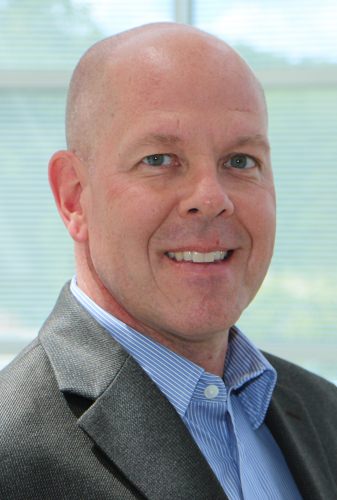Waisman Biomanufacturing has new managing director
Carl Ross has been selected to serve as managing director of Waisman Biomanufacturing. His appointment started July 1, following more than a year as its interim director.
Located at the University of Wisconsin–Madison Waisman Center, the primary mission of Waisman Biomanufacturing is to help UW scientists and others efficiently translate scientific discoveries into early-stage clinical trials. It helps develop manufacturing processes and quality-control methods and provides overall product development and regulatory support.
Ross has more than 26 years of industry experience developing and optimizing novel fermentation processes and advancing a wide range of cell and gene therapies, vaccines and therapeutic proteins into human clinical trials. He has worked at Waisman Biomanufacturing since its inception in 2001 and served as its assistant director, overseeing the highly trained staff and well-equipped facility, before his appointment as interim director in 2016.
“We are thrilled to have Carl continue to lead Waisman Biomanufacturing, now on a more permanent basis,” says Albee Messing, director of the Waisman Center, a research center focused on human development, developmental disabilities and neurodegenerative diseases. “He brings a wealth of experience and knowledge about accelerating the advancement of novel biological therapies and vaccines, as well as an excellent understanding of the complexities of clinical trials and good manufacturing practices.”
Since opening its clinical Current Good Manufacturing Practice facility (cGMP, a designation of the Food and Drug Administration) in 2001, Waisman Biomanufacturing has helped create more than 320 clinical-grade products and earned a reputation for working closely with clients for cost-effective and timely manufacture of quality products.
“The challenge and opportunity to help bring advanced, next-generation therapies to the clinic has been a passion for me during the last 16 years at Waisman Biomanufacturing,” says Ross. “As managing director, I look forward to an expanded role in the selection and execution of our projects as well as the training and development of staff.”
With 10,000 square feet of facility space, Waisman Biomanufacturing employs more than 30 full-time and 25 part-time staff members in manufacturing, quality control, quality assurance and administrative areas. It also operates and maintains seven cGMP compliant cleanroom areas to accommodate clinical production of mammalian and microbial therapies and aseptic filling of final products.
The primary mission of Waisman Biomanufacturing is to help UW scientists and others efficiently translate scientific discoveries into early-stage clinical trials.
Several well-known Madison-based biotech companies started by UW–Madison faculty have partnered with and benefited from the experience and expertise of Waisman Biomanufacturing staff. These include Madison Vaccines Incorporated, Cellular Dynamics International (since acquired by Fujifilm), and Stratatech (recently acquired by Mallinckrodt Pharmaceuticals, a company based in the United Kingdom).
Waisman Biomanufacturing is currently in collaboration with Cynata Therapeutics, an Australian stem cell and regenerative medicine company, to test and develop therapies based on a proprietary stem cell technology. Staff are also working with UW–Madison scientists Tom Turng, Naomi Chesler, Igor Slukvin and James Thomson (who is also director of regenerative medicine at the Morgridge Institute for Research) to test in clinical trials artery cells derived from stem cells.
Plans are underway for a $2.5 million investment to improve and upgrade Waisman Biomanufacturing’s facilities and systems over the next 12 to 18 months. It will allow the center to prepare for the next generation of biopharmaceuticals.
“I am honored to lead the highly skilled and motivated Waisman Biomanufacturing team and proud of the work that we do as an example of the Wisconsin Idea,” says Ross. “I am also inspired by my colleagues at the Waisman Center and all that they do to assist families and advance research involving intellectual and developmental disabilities.”





